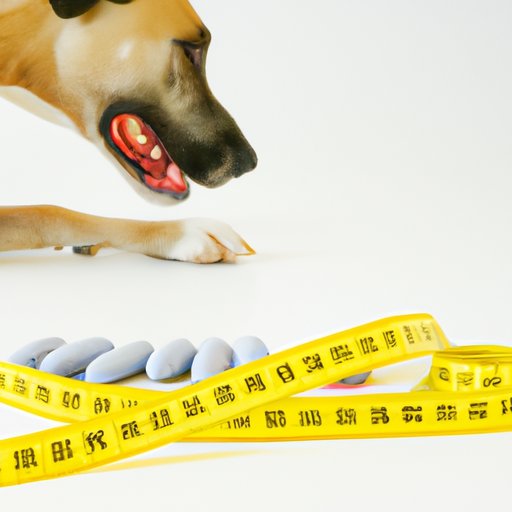
Introduction
Having a skinny dog can be a worrying and frustrating experience for pet owners. A dog that is underweight may lack energy, have a dull coat, and be more susceptible to illnesses. This article will provide you with some tips and tricks to help your skinny dog gain weight in a healthy and sustainable way.
Find a High-Calorie Dog Food Recipe
A high-calorie diet is crucial for dogs that need to gain weight. Commercial dog foods may not always have the right balance of nutrients or the appropriate calorie count for your dog’s particular needs. Consider switching to homemade dog food that is dense in calories and packed with nutrients. Some good sources of natural fat include chicken, beef, lamb, and fish, as well as healthy fats like coconut oil and flax seeds.
When making homemade dog food, it’s important to ensure that it contains all of the necessary vitamins, minerals, and nutrients that your dog needs. Avoid relying solely on one type of protein, as this can be harmful to your dog’s health. Consult with your veterinarian or a professional dog nutritionist to find the right recipe for your dog’s needs. Be sure to monitor your dog’s food intake and adjust the recipe as necessary to prevent overeating or undernourishment.
Consider Giving Supplements to Your Dog
Supplements can also help your dog gain weight by providing essential nutrients and supporting a healthy metabolism. Some popular supplements for underweight dogs include omega-3 fatty acids, digestive enzymes, and probiotics. These supplements can help improve your dog’s immune system, boost their energy, and improve their digestion. However, it’s important to consult with your veterinarian before introducing any new supplements to your dog’s diet to ensure they are safe and appropriate. Make sure to follow the dosage and administration instructions closely, and look out for any reactions that your dog may have.
Make Sure Your Dog is Getting Enough Protein in Their Diet
Protein is essential for building muscle mass, improving energy levels, and supporting overall health. Choose high-quality protein sources such as chicken, beef, lamb, and fish to add to your dog’s diet. These foods are not only high in protein, but they are also rich in other nutrients like iron and zinc. Additionally, feeding your dog high-protein dog food can help support healthy muscle growth and promote weight gain.
Encourage Exercise But Avoid Excessive Physical Activity
While exercise is important for overall health, it can also help your skinny dog gain weight. Regular exercise can stimulate your dog’s appetite and promote muscle growth. However, it’s important to avoid excessive physical activity, which can burn too many calories and impede weight gain. Provide your dog with low-to-moderate intensity exercise, such as regular walks or light playtime. Avoid excessive running or playing, as this can lead to exhaustion and muscle burnout. Additionally, be sure to monitor your dog’s activity levels and adjust accordingly.
Consult with Your Veterinarian to Rule Out Any Underlying Health Issues
If your dog is not responding to the tips and tricks mentioned above or continues to lose weight, it’s important to consult with your veterinarian. They can conduct a physical examination and recommend specific tests to rule out any underlying health issues or medical conditions that may be contributing to your dog’s weight loss. Additionally, your veterinarian can provide you with specific advice and recommendations on how to help your skinny dog gain weight in a healthy and sustainable way.
Conclusion
Gaining weight can be a challenging process for skinny dogs, but with patience and persistence, it can be done in a healthy and sustainable way. A high-calorie diet, supplements, protein-rich foods, appropriate exercise, and consultation with a veterinarian are all beneficial strategies for helping your skinny dog gain weight. Remember to monitor your dog’s progress closely, adjust your approach as needed, and remain persistent in your efforts to help your furry friend gain weight.





